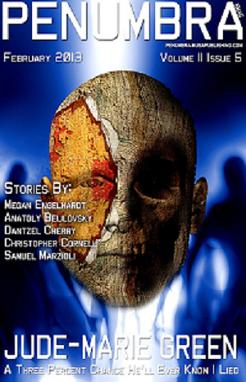“Oh, the Places You’ll Hide: A Brief Guide for the Library Specialist After the Undead Uprising” by Megan Engelhardt
Reviewed by Stevie McMichael
An issue dedicated to the living dead, and the apocalypses they cause. Some are gruesome tales, some thoughtful and creepy, and a few miss the mark a bit.
“The Business is Dying,” by Dantzel Cherry, is set in a world where the apocalypse happened and life went on around it. Zombies, both human and animal, are kept in zoos. The protagonist, Quentin, has both his parents in a zoo, and cares for them as he would any other pet: taking them for walks, spraying them with water to ease the heat. He spends his time attempting to find a way to let the dead truly die.
This was a short story, but I like the premise: the idea that society can be rebuilt after an apocalypse. Quentin and the zookeeper, Jack, take it all in stride, hinting that the world has been this way for quite some time. It felt a little too short, however, and I thought the ending was pretty predictable.
Megan Engelhard‘s “Oh, the Places You’ll Hide: A Brief Guide for the Library Specialist After the Undead Uprising” is exactly what the title implies: the story and advice of a former librarian in the world of the living dead. In it, librarians have become itinerate producers of knowledge, carrying around books to give to ‘the right person, in the right place, at the right time’. They act as messengers, teachers, and any other thing a particular community might need.
Narrated in the first person, I thought this story was wickedly funny. It’s structured like a normal guide-book, complete with headers saying things like “Youth Services” (a section which includes the line “Remember to include active dances and loud songs to cover up the screaming.”) It strikes a wonderful balance between dryness and very dark humor.
“Last Man Standing,” by Anatoly Belilovsky, is narrated by a young boy who’s just lost his mother to the zombies. She’d been an apathetic alcoholic since his father died, leaving him to largely fend for himself, but sacrifices herself to protect him when the zombies come.
This was another very short story, but I liked the narrator. His age is never specified, but he sounds quite young, practical beyond his years. There was also an intriguing, if somewhat throwaway line, stating that the undead never attack their own family. That’s something I wish had been expanded upon, if only a little.
In Jude-Marie Green‘s “A Three Percent Chance He’ll Ever Know I Lied,” the narrator’s husband is dying of cancer. She’s a doctor who has been researching a chemical that can resurrect the dead, though only in thirteen percent of cases. Of that group, only three percent return with all their mental faculties intact, and they have a limited amount of time before the craving to eat humans overtakes them. Her husband makes her promise she won’t try to resurrect him when he dies, which she ignores.
I wasn’t so fond of this one. The premise is interesting, but I found it somewhat predictable. The narrator is a sympathetic character, but the ending is pretty much a foregone conclusion.
Christopher Cornell‘s “Bleeding Heartland” is told by a corn farmer in the Midwest. The zombies that attacked the coastal cities were flesh-eating monsters, but the ones that have reached the grain belt are only interested in corn. While many people are content to let them have the harvest, our narrator is not: he comes up with a creative way of taking care of the problem once and for all.
This was another very short one, but I liked it a lot. The narrator sounded exactly like he should, a no-nonsense farmer who seemed to regard the zombies as any other harvest-ruining pest.
“Midnight Visitors,” by Samuel Marzioli, follows a group of survivors post-apocalypse. Each night, someone’s dead loved one will come to the door, trying to tempt the survivors into following them, and it becomes more and more difficult for most of them to resist. One by one they give in, until the narrator is the only one left behind.
The dead in this story are given an interesting treatment: they look healthy and alive, can speak to the living to lure them outside, and don’t even have to have died recently. The narrator mentions having seen his younger brother, who had died years before, moving among them. It’s that little twist that made the story memorable to me, where it otherwise would have seemed cliché.
